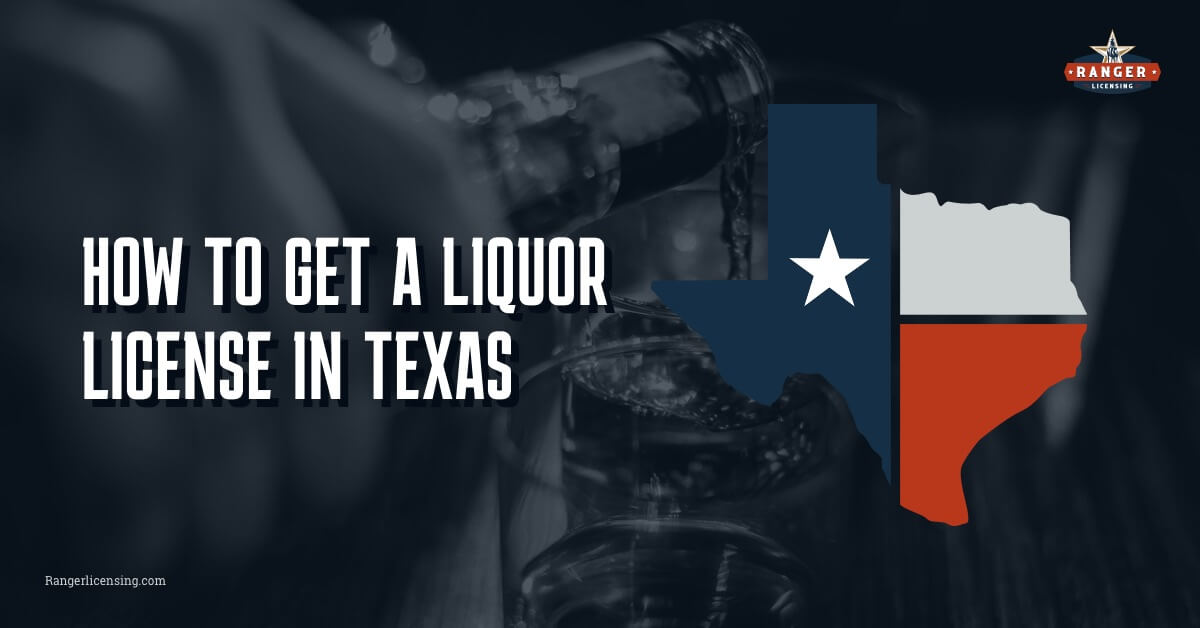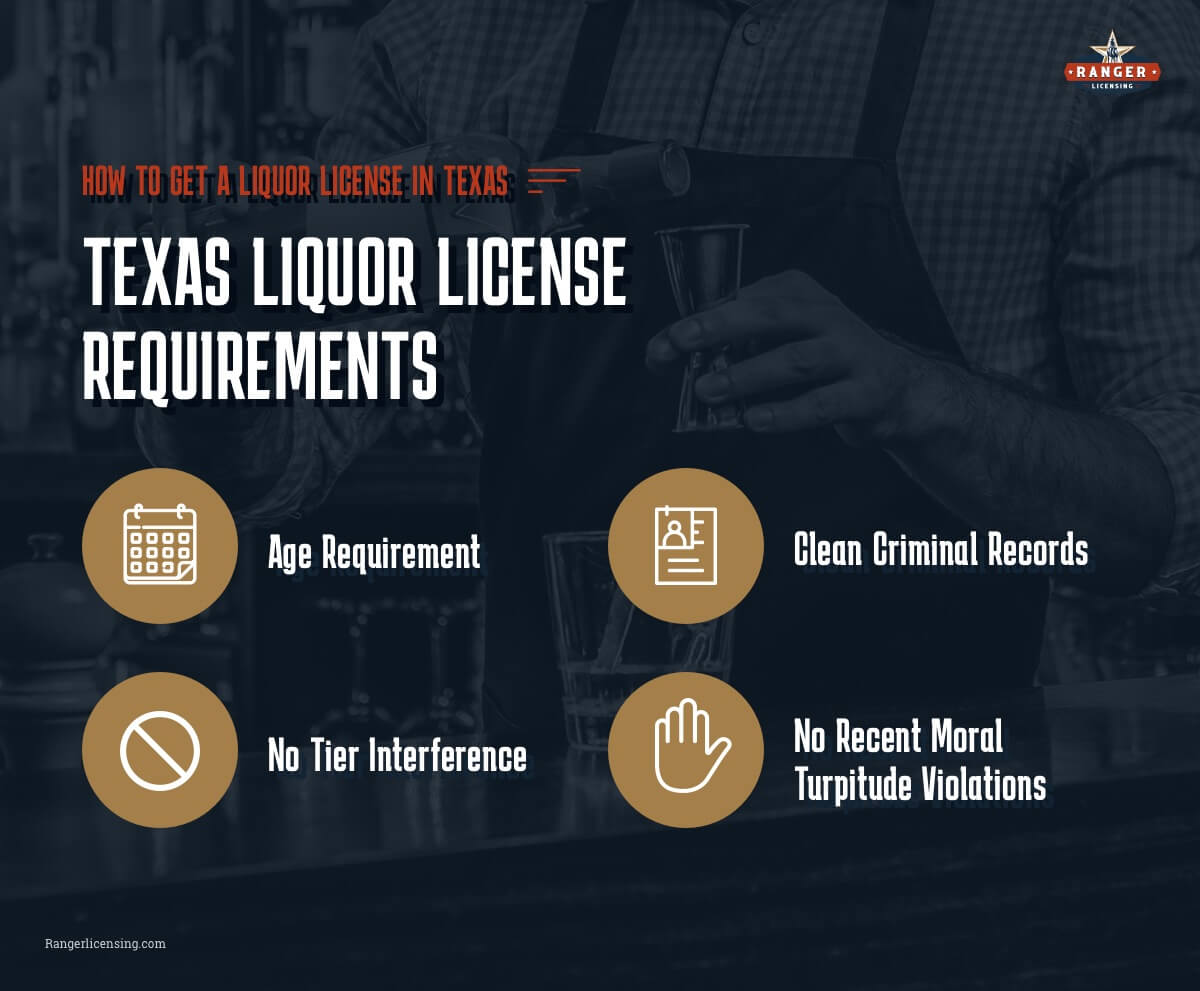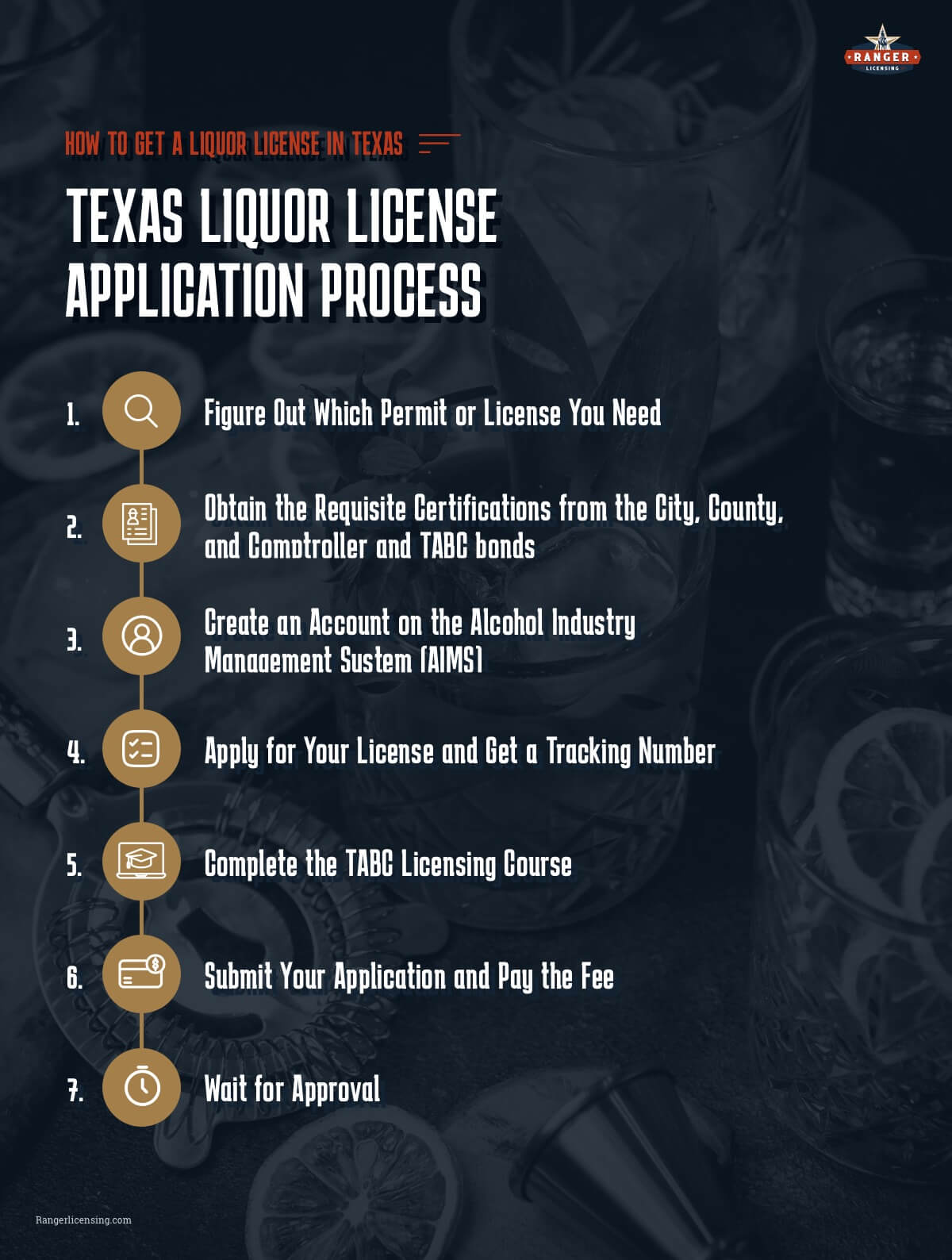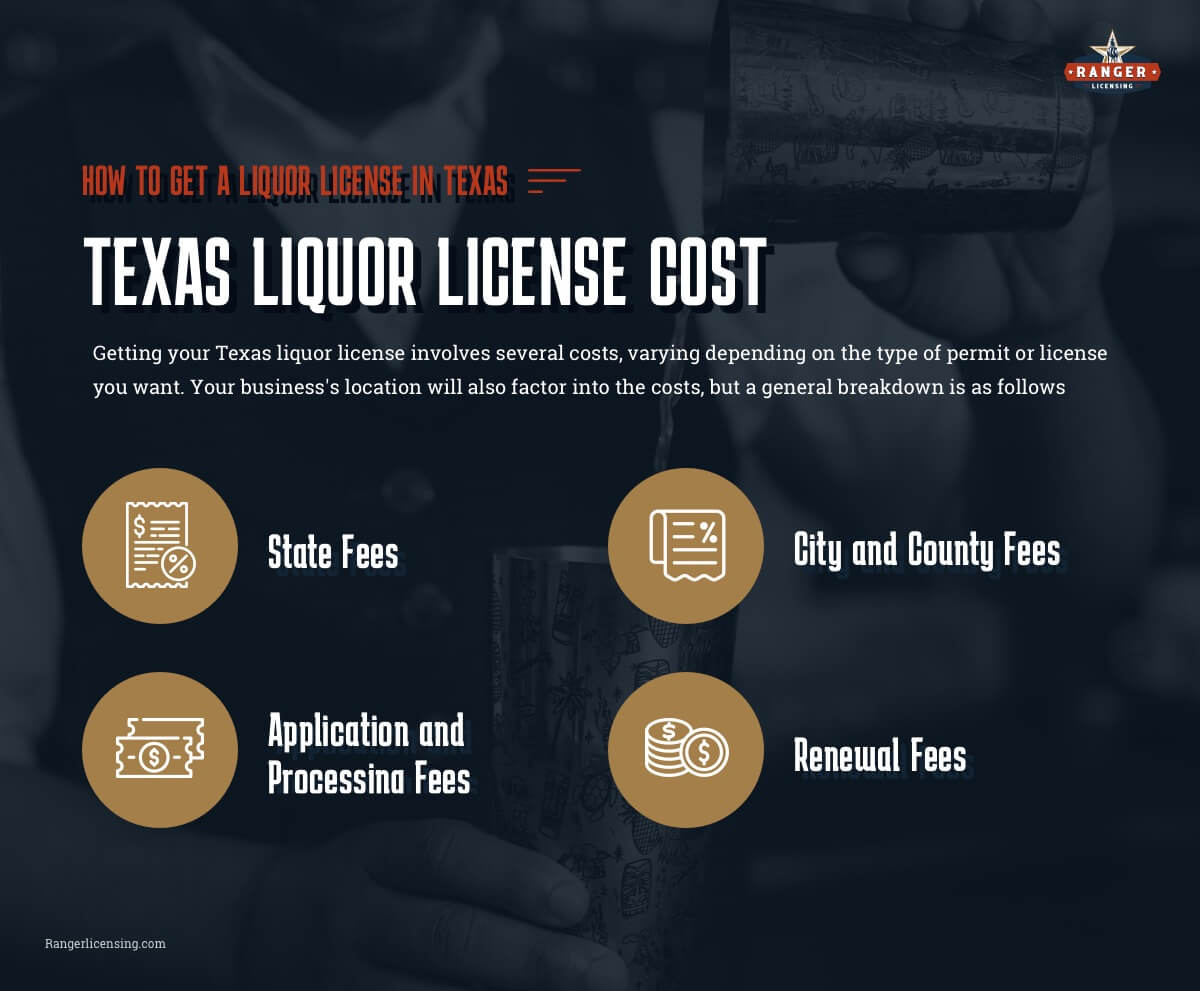Owning and operating a liquor, wine, or beer retail business in Texas’ thriving hospitality industry is a highly profitable endeavor. Whether you are aspiring to open your establishment or already manage a bar, restaurant, or liquor store, selling alcoholic beverages, including specialty items like malt liquor, can substantially boost your revenue. However, before you can legally sell or serve alcohol in Texas, you must obtain your liquor license to comply with state laws.
The TABC liquor licensing process in the Lone Star State is a critical step that the Texas Alcoholic Beverage Commission (TABC) regulates. You must decide which license type you need, check that your business meets the eligibility requirements, gather the correct forms, complete your TABC certification, and use TABC’s Alcohol Industry Management System (AIMS) to apply for your license for serving alcoholic beverages.
Ranger Licensing wants to make it as painless as possible to get a liquor license and will guide you through the process step by step. We will make the process as simple as possible and answer common questions so you have everything you need to make it through the liquor license application below.
Understanding the Basics
Before we talk about the more complex issues that come with getting your liquor license in Texas, you must understand why getting one is necessary for serving alcohol. A liquor license is a legal permit your state’s governing body issues that allows a business to serve, make, or have alcohol sales on its premises. In Texas, TABC, is this governing body. The reason you must have this license is twofold. First, it ensures that your business stays compliant with state and local laws. Second, it helps protect public safety by restricting the sale and consumption of alcoholic beverages in a safe, controlled environment.
In Texas, you can obtain dozens of potential liquor licenses and permits. Each caters to different business activities surrounding alcoholic drinks, such as on-premise consumption or operating a liquor store. The following is a list of the types of TABC certificate options, permits, and alcoholic beverage licenses that you can obtain:
- Retail Permits
- Mixed Beverage Permit
- Mixed Beverage Permit with a Food and Beverage Certificate
- Wine and Malt Beverage Retailer’s Permit
- Wine and Malt Beverage Retailer’s Off-Premise Permit
- Retail Dealer’s On-Premise License
- Retail Dealer’s Off-Premise License
- Private Club Registration Permit
- Private Club Malt Beverage and Wine Permit
- Private Club Exemption Certificate
- Package Store Permit
- Wine-Only Package Store Permit
- Passenger Transportation Permit
- Manufacturing Permits
- Brewer’s License
- Winery Permit
- Distiller’s and Rectifier’s Permit
- Out-of-State Winery Direct Shipper’s Permit
- Nonresident Brewer’s License
- Nonresident Seller’s Permit
- Distribution Permits
- General Distributor’s License
- Branch Distributor’s License
- Wholesaler’s Permit
- General Class B Wholesaler’s Permit
- Other Licenses and Permits
- Nonprofit Entity Temporary Event Permit
- Consumer Delivery Permit
- Bonded Warehouse Permit
- Manufacturer’s Agent’s Warehousing Permit
- Carrier’s Permit
- Promotional Permit
- Third-Party Local Cartage Permit
- Subordinate Licenses and Permits
- Brewer’s Self-Distribution License
- Forwarding Center Authority
- Brewpub License
- Food and Beverage Certificate
- Late Hours Certificate
- Water Park Permit
- Local Distributor’s Permit
Remember, Texas law dictates that each alcohol license and permit on the list comes with regulations, rules, and fees, so you must determine whether your business needs one. You should thoroughly review each one and ask for help if needed to ensure you apply for the correct one and meet the liquor license requirements. Contact Ranger licensing today if you need assistance obtaining a Texas liquor license.
Eligibility Criteria – Texas Liquor License Requirements
Obtaining a Texas liquor licenses is more than just filling out an application and paying a fee. The TABC sets strict and specific eligibility criteria that every applicant must meet before applying and going through the liquor license application process. The key criteria include the following:
Age Requirement
Any applicant for a liquor license must be 21 years of age or older. This age limit falls in line with the legal drinking age in the United States, and it helps ensure that the people who sell and distribute alcohol are of legal age themselves.
Clean Criminal Records
Applicants for a liquor license in Texas cannot have a felony conviction within the last five years of applying. This reflects how seriously Texas treats the distribution and sale of alcohol, and it helps ensure that only people with good moral character can get this permit or license.
No Tier Interference
The applicant should not have any vested interest in a TABC permit inside a different system tier. Texas’s Alcoholic Beverage Code has a stringent three-tier system, with one tier for manufacturers, one for distributors, and one for retailers. In most cases, a company or an individual is not allowed to hold permits in more than one tier at a time.
No Recent Moral Turpitude Violations
The applicant cannot have any moral turpitude violations within six months of applying for the permit or license to sell alcohol. This includes crimes involving immoral behavior or dishonesty, like fraud or theft. This helps ensure that anyone who sells alcohol will abide by the laws.
These essential requirements are part of the state’s checks and balances system to help regulate the alcohol industry. You must meet these criteria before applying for your license in Texas. If you are unable to meet them, you will waste money and time during the application process because the state will deny your request.
The Application Process
In Texas, obtaining a liquor license or permit is a structured and detailed process. Below is a step-by-step guide to help you get through the application as quickly as possible.
- Figure Out Which Permit or License You Need
With the range of licenses and permits available in the state, you first must decide which one fits your business model. Go to the TABC website and review your options before you make a final choice. - Obtain the Requisite Certifications from the City, County, and Comptroller and TABC bonds
In the state of Texas, the city and county of your retail location is responsible for determining whether your location is eligible to serve alcohol for on-premises or off-premises consumption. TABC requires this certification be obtained prior to submitting your application. Prior to submitting their application, retailer applicants must also confirm their eligibility for a TABC permit with the Comptroller of Public Accounts. Retailer applicants who owe taxes to the State of Texas may be ineligible. Retailer applicants may also be required to post TABC bonds prior to submission. Ranger Licensing’s attorneys are available to assist you in overcoming these certification obstacles, ensuring a seamless and hassle-free application process. - Create an Account on the Alcohol Industry Management System (AIMS)
When you narrow down the correct liquor licenses or permits, you must create an account on AIMS. This is an online portal the TABC uses to process permits and licenses, and this is how you apply for yours. - Apply for Your License and Get a Tracking Number
Once you apply through the portal for your Texas liquor licenses, you will get a tracking number from your local Office of the City Clerk and a County Clerk certificate. Keep this number somewhere safe because you will use it to check your application status. You will also need it for any questions or further communication regarding your application. - Complete the TABC Licensing Course
This course gives you valuable information and training. It gives you an in-depth look at the regulations and laws surrounding selling or consuming alcohol in Texas. You will not be able to get your license without going through and completing this course. - Submit Your Application and Pay the Fee
After you meet all the eligibility criteria and go through the TABC Licensing Course, you can formally submit your application through the portal and pay the fee. This licensing fee will vary depending on which type of license or permit your business requires. - Wait for Approval
When you submit your application, it will go through a review process, which can take several weeks to several months to complete. You can periodically check your application’s status using your tracking number in the portal.
You should note that the Texas Alcoholic Beverage Commissioner might require you to submit more documentation, background checks, or certifications, depending on the type of license or permit you apply for. Check the specific requirements for your desired license or alcohol permit on the TABC website so you do not slow down the review process.
You should note that the Texas Alcoholic Beverage Commissioner might require you to submit more documentation, background checks, or certifications, depending on the type of license or permit you apply for. Check the specific requirements for your desired license or alcohol permit on the TABC website so you don’t slow down the review process.
Texas liquor license cost
Getting your Texas liquor license involves several costs, varying depending on the type of permit or license you want. Your business’s location will also factor into the costs, but a general breakdown is as follows:
State Fees
Liquor licenses or permits have different state fees attached, and they can start at a few hundred dollars and go up to several thousand dollars a year. You can find the latest fee schedule for your specific liquor license cost on the TABC website.
City and County Fees
You will pay city and county fees along with your state fees. They can go up to half of your state fee, and your location will determine the final cost.
Application and Processing Fees
To submit your application and get it processed, there’s usually a fee that helps to cover the administrative costs of processing the application.
Renewal Fees
In Texas, buying liquor licenses is not a one-time purchase, and you must periodically renew it. This fee will depend on your license or permit, and it typically amounts to the same county, city, and state fees you initially paid.
Maintaining Your Texas Liquor License
Once you get your license, it is your responsibility to maintain it. To do so, you must:
Comply with Liquor Laws
Ensure that you follow all applicable laws to avoid paying penalties or having your license revoked or suspended.
Sign Requirements
Display all TABC-required signage in your business, like warnings about drinking while being pregnant and the penalty for getting caught drinking underage.
Authorized Selling Times
Only allow alcohol sales during the permitted hours to avoid penalties and violations.
Staff Certifications
Encourage your staff to complete the TABC licensing courses for responsible alcohol sales and service.
Reporting Disturbances
Promptly report any violations or disturbances at your business, including underage drinking or fights.
License Renewal
Track the expiration date on your license application and start renewing it in advance so it does not lapse.
Additional Considerations
Along with everything we have covered thus far, here are a few more things to keep in mind to ensure your business stays in good standing with the Texas Alcoholic Beverages Code:
Local Ordinances and COVID-19 Impact
Consider how local laws and any current pandemic-related regulations impact your liquor license process and operations. A municipality’s wet or dry status has a significant impact on your ability to sell and serve alcohol as a retailer.
Navigation Tips
Plan ahead, organize any documents, and check your application status regularly to streamline the process.
Hire a Liquor Licensing Agency
To ensure you understand all of the regulations and laws surrounding your permit or license, it’s a good idea to call (713) 880-2992 or contact us for a free consultation
Conclusion
Getting a liquor license or permit in Texas involves understanding which permits or licenses you need, meeting the eligibility criteria, completing the application process, paying fees, and making sure you stay in compliance when you get your license. Although learning how to get a liquor license in Texas may seem complicated, if you stay organized, go through the process, and consider hiring Ranger Licensing, you can successfully get your license and survive and thrive in Texas’ hospitality industry. Contact us today for a free consultation.
Resources
- TABC Licenses and Permits
- Texas Alcoholic Beverage Commission (TABC) Website
- TABC AIMS Portal
- TABC Fees
FAQs
In Texas, what is the legal drinking age?
You can legally drink in Texas at 21.
Which business types need a TABC license or permit in the alcoholic beverage industry?
Any business that plans on serving, selling, or manufacturing alcoholic beverages in Texas needs this license or permit.
How much will you pay for a TABC license in Texas?
The cost of this license will vary depending on which one you need. For example, permits for selling beer and wine typically start at $1,100 and go up to $1,900, but distilled spirits permits can cost upwards of $5,300.
Do I need a TABC license to serve alcohol if it’s a private event?
No, you are not required to have this license or permit if you host a private event like a birthday party or wedding that is not open to the public. This also applies to private clubs.
In Texas, can I legally sell alcohol without a TABC license or permit?
No, it is illegal to sell alcohol without a license or permit.
How long will my Texas-issued TABC license be good for?
Generally, you will need to renew most TABC licenses every two years, but this varies by license or permit type.
Can I apply online for my TABC license?
Yes, you can apply through the TABC’s website.
Is it possible to apply for multiple liquor licenses at once?
Yes, if your business requires multiple types, you can apply for them all simultaneously.
Is it legal to sell alcohol in Texas at a temporary event?
You can get a temporary permit from the TABC to sell alcoholic beverages at a fair, festival, or other temporary event.
In Texas, is it legal to sell alcohol after 2 a.m.?
No, you cannot sell alcohol in Texas between the hours of 2 a.m. and 7 a.m. without risking losing your liquor license.
Can you sell alcohol to a potentially intoxicated customer?
No, it is illegal for you to serve or sell alcohol in Texas to a customer who appears intoxicated.
After I submit my application, how long does it take to process?
The processing time will vary depending on the type of license or permit you need. Generally, it can take a few weeks to a few months to complete.
If I have a criminal record, can I apply for a TABC license?
You can, but whether you get your liquor licenses or permits will depend on your criminal record. The TABC has the power to deny any applicant who has misdemeanors or felony convictions if it relates to selling or consuming alcohol.



